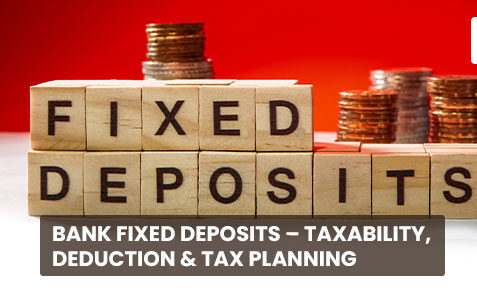Fixed Deposit
A fixed deposit (FD) in India is a popular and secure investment option offered by banks and financial institutions. It is a type of term deposit where individuals can invest a specific amount of money for a predetermined period, earning a fixed interest rate. Fixed deposits are known for their safety, liquidity, and guaranteed returns, making them a preferred choice for conservative investors seeking stable returns over a fixed period.
Here's an overview of fixed deposits in India:

Key Features of Fixed Deposits:
Fixed Tenure: Fixed deposits have a fixed maturity period, ranging from a few days to several years. Investors choose the tenure based on their financial goals and liquidity requirements.
Guaranteed Returns: One of the main attractions of fixed deposits is the assurance of fixed and guaranteed returns over the investment period. The interest rate is determined at the time of deposit and remains constant throughout the tenure.
Interest Payment Options: Interest on fixed deposits can be paid out at regular intervals (monthly, quarterly, or annually) or compounded and paid along with the principal amount at maturity.
Liquidity: Fixed deposits offer varying degrees of liquidity. While some deposits may have a lock-in period where premature withdrawal is not allowed, others provide partial or complete withdrawal options with penalties.
Safety: Fixed deposits are considered safe investments as they are backed by the deposit insurance cover provided by the Deposit Insurance and Credit Guarantee Corporation (DICGC) up to ₹5 lakh per depositor per bank.
Benefits of Fixed Deposits:
Stable Returns: Fixed deposits offer predictable and stable returns, making them suitable for risk-averse investors looking for regular income or capital preservation.
Risk Mitigation: FDs carry minimal risk compared to investments like equities or mutual funds, making them a suitable option for those who prioritize capital protection.
Easy to Understand: Fixed deposits are straightforward to understand and invest in. Individuals are aware of the exact amount they will receive at maturity, which helps with financial planning.
Diversification: Investors often allocate a portion of their portfolio to fixed deposits as a diversification strategy to balance risk and returns across different asset classes.
Tax Benefits: Fixed deposits with a lock-in period of 5 years are eligible for tax benefits under Section 80C of the Income Tax Act, subject to certain conditions.
Considerations:
Interest Rates: Compare interest rates offered by different banks and financial institutions before investing. Higher interest rates can significantly impact your returns.
Lock-In Period: Some FDs may have a lock-in period where premature withdrawal is not allowed. Be sure to consider your liquidity needs before investing.
Tax Implications: Interest earned on fixed deposits is taxable as per the investor’s applicable tax slab. Consider the tax implications when calculating your returns.
Penalties: Premature withdrawal of fixed deposits before maturity often incurs penalties in the form of reduced interest rates.
Inflation: While fixed deposits provide guaranteed returns, they may not always outpace inflation, leading to erosion of purchasing power over time.


